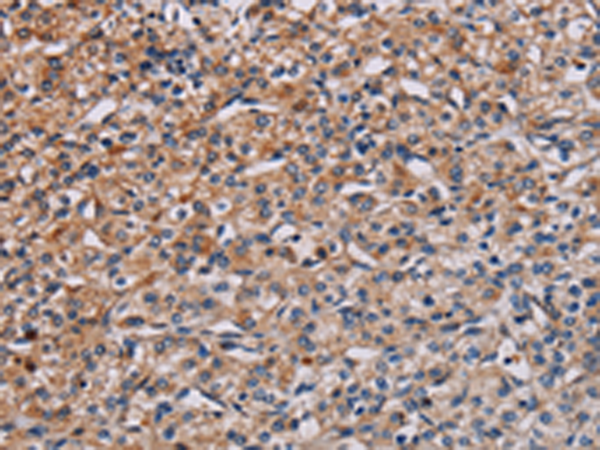


| WB | 咨询技术 | Human,Mouse,Rat |
| IF | 咨询技术 | Human,Mouse,Rat |
| IHC | 1/50-1/200 | Human,Mouse,Rat |
| ICC | 技术咨询 | Human,Mouse,Rat |
| FCM | 咨询技术 | Human,Mouse,Rat |
| Elisa | 1/1000-1/2000 | Human,Mouse,Rat |
| WB Predicted band size | 139 kDa |
| Host/Isotype | Rabbit IgG |
| Antibody Type | Primary antibody |
| Storage | Store at 4°C short term. Aliquot and store at -20°C long term. Avoid freeze/thaw cycles. |
| Species Reactivity | Human, Mouse, Rat |
| Immunogen | Synthetic peptide of human PLCB3 |
| Formulation | Purified antibody in PBS with 0.05% sodium azide and 50% glycerol. |
+ +
以下是关于PLCB3抗体的3篇参考文献及其简要摘要:
---
1. **文献名称**:*PLCB3 regulates proliferation and apoptosis in colorectal cancer via PI3K/AKT signaling*
**作者**:Li Y, et al.
**摘要**:该研究利用PLCB3特异性抗体分析结直肠癌组织中PLCB3的蛋白表达水平,发现其通过调控PI3K/AKT通路影响肿瘤细胞增殖与凋亡,为潜在治疗靶点提供依据。
---
2. **文献名称**:*Phospholipase C-β3 modulates mast cell functions by regulating intracellular calcium signals*
**作者**:Kim D, et al.
**摘要**:通过PLCB3抗体进行免疫印迹和免疫荧光实验,发现PLCB3在肥大细胞中介导钙离子信号传导,影响组胺释放及炎症反应,揭示其在过敏性疾病中的作用机制。
---
3. **文献名称**:*A novel PLCB3 antibody reveals distinct expression patterns in neuronal development*
**作者**:Suzuki T, et al.
**摘要**:研究开发了一种高特异性PLCB3抗体,证实其在小鼠脑组织及神经元分化过程中的动态表达,提示PLCB3可能参与神经突触可塑性与发育调控。
---
若需更详细文献信息或DOI号,可进一步提供具体查询方向。
The phospholipase C beta 3 (PLCB3) antibody is a tool used to detect and study the PLCB3 enzyme, a member of the phospholipase C (PLC) family. PLC enzymes play critical roles in intracellular signaling by hydrolyzing phosphatidylinositol 4.5-bisphosphate (PIP2) into secondary messengers, inositol trisphosphate (IP3) and diacylglycerol (DAG), which regulate processes like calcium release and protein kinase C activation. PLCB3. encoded by the PLCB3 gene, is specifically involved in G protein-coupled receptor (GPCR) signaling pathways and is expressed in various tissues, including the brain, immune cells, and platelets.
PLCB3 antibodies are commonly utilized in research to investigate the enzyme's expression, localization, and function in both physiological and pathological contexts. For example, studies have linked PLCB3 dysregulation to immune disorders, neurological conditions, and cancer progression. These antibodies enable techniques such as Western blotting, immunohistochemistry, and immunofluorescence to visualize PLCB3 protein levels in cellular or tissue samples.
Most PLCB3 antibodies are produced in hosts like rabbits or mice, targeting specific epitopes of the protein. Validation methods, including knockout controls or siRNA knockdown, ensure specificity. Commercial availability from biotech vendors facilitates their use in academic and clinical research, contributing to a deeper understanding of PLCB3's role in cellular signaling and disease mechanisms. Ongoing research continues to explore its potential as a therapeutic target or diagnostic marker.
×